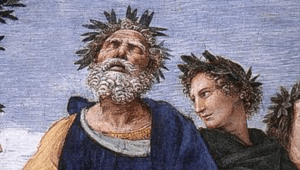We support our Publishers and Content Creators. You can view this story on their website by CLICKING HERE.
Sign up for Joseph Pearce’s course on Classical Epic and Tragedy this Fall: https://rosary.college/applicant-registration/
 What do the great literary epics tell us about the epochs in which they were written? And, more important, what do these epics and epochs tell us about our own epoch? To what extent are literary epics the children of their own times, expressions of their own particular zeitgeist, and to what extent are they expressions of perennial truths that transcend fads, fashions and other temporal ephemera? Considering the epics of Homer and Virgil will enable us to understand these questions and to move towards answering them.
What do the great literary epics tell us about the epochs in which they were written? And, more important, what do these epics and epochs tell us about our own epoch? To what extent are literary epics the children of their own times, expressions of their own particular zeitgeist, and to what extent are they expressions of perennial truths that transcend fads, fashions and other temporal ephemera? Considering the epics of Homer and Virgil will enable us to understand these questions and to move towards answering them.
As Homer tells us in the opening lines of The Iliad, its theme is the pride and anger of Achilles and the destructive and devastating consequences of such prideful anger. In other words, on the most basic level, pride precedes a fall. Yet Homer goes much deeper than this. He illustrates that pride destroys and devastates the lives of the innocent. It is not merely the sinner who suffers the consequences of sin, he also inflicts suffering on others with every prideful act. Pride does not merely precede a fall, it claims innocent victims. And Homer goes deeper still. He tells us at the very beginning of The Iliad, immediately after informing us that his theme is Achilles’ pride and its destructive consequences, that the will of Zeus is accomplished. In other words, the hand of providence ultimately triumphs over pride in the way in which God punishes the sinner with the consequences of his sin. But what are we to make of the innocent victims? Is it God’s will that they suffer the effects of the sins of others?
These questions are addressed in Homer’s other epic, The Odyssey. At the beginning of this epic, Zeus states that men are always blaming the gods for the suffering in their lives, whereas suffering is caused by their own recklessness, with the exception of that suffering which is “given”. In other words, suffering can be caused by sin or it can be a gift. The remainder of The Odyssey is a playing out of Homer’s exposition of the mystery of suffering, or what C. S. Lewis called “the problem of pain”. Odysseus and his men suffer greatly from the consequences of their own recklessness but, in Odysseus’ case, he learns that suffering is a gift which must be accepted and even embraced as a means of growing in wisdom and humility.
Virgil’s epic, The Aeneid, was written twenty to thirty years before the birth of Christ and about 800 years after Homer wrote The Iliad and The Odyssey. Unlike the works of Homer, which address perennial truths transcending the fads and fashions of the age in which they were written, Virgil was apparently doing the bidding of his political masters, especially the Roman Emperor, Caesar Augustus. The Aeneid is a patriotic poem, eulogizing the glories of imperial Rome. It is, therefore, a child of the epoch in which it was written to a degree that is much less the case with the Homeric epics. It was unfinished at the time of Virgil’s death and his last wish was that the poem should be destroyed. It would seem, therefore, that Virgil was unhappy with it.
Why was this?
It is, of course, difficult to know the answer to this enigmatic question. One possible answer is that Virgil was uncomfortable serving as the de facto poet laureate of imperial Rome. Perhaps he felt that he was betraying his Muse in the writing of a patriotic work, presumably at the behest of Caesar, which glorified Rome as the dominant imperial power in the world.
Although we cannot know the reasons for Virgil’s apparent dislike of his own epic, we can at least be happy that his final wish was not carried out. We can thank Caesar himself for preserving The Aeneid for posterity, since it was he who forbade its destruction and ordered its publication. In doing so, he gave us the fruits of Virgil’s genius. Without his timely intervention, we would be bereft of Virgil’s depiction of the tragic passion of Aeneas and Dido, the “prisoners of lust” who forsook their responsibilities to indulge in erotic self-gratification. We would also be bereft of the vision of the after-life, in which Virgil adds flesh, or at least shades of colour, to Homer’s theological musings on the judgment of the dead. Such musings would inspire Dante’s own epic, The Divine Comedy, without which we would all be so much the poorer.
Returning to our original questions, we can conclude that Homer’s epics tell us less about the epoch in which they were written than does Virgil’s, the latter of which is very much a product of its own time? To that extent, insofar as Homer’s works are less the children of their own time, and insofar as they transcend the expression of any particular zeitgeist, shining forth perennial truths, it is tempting to judge Homer to be Virgil’s superior. Since, however, all three epics are not for an age but for all ages, it would be a foolhardy judge who succumbed to the temptation to pass judgment. Since the present author is not foolish enough to rush in where wiser judges fear to tread, he will simply confess the temptation without succumbing to it.
This essay was first published here in December 2021.
The Imaginative Conservative applies the principle of appreciation to the discussion of culture and politics—we approach dialogue with magnanimity rather than with mere civility. Will you help us remain a refreshing oasis in the increasingly contentious arena of modern discourse? Please consider donating now.
The featured image is “The Parnassus” (detail), painted between between 1509 and 1510, by Raphael, and is in the public domain, courtesy of Wikimedia Commons.
Share This Story, Choose Your Platform!
Go to Top

 Conservative
Conservative  Search
Search Trending
Trending Current News
Current News 






